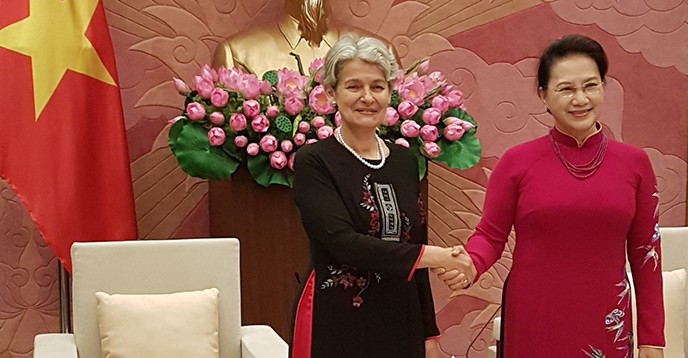The decades-long cooperation has had far-reaching influences on the lives of locals
UNESCO Director-General Irina Bokova reaffirmed the strong ties that bind the agency and Vietnam during a series of high-level meetings in Hanoi earlier this week, highlighting opportunities for scaling up bilateral cooperation for Vietnamese development.
Nguyen Thi Kim Ngan, Chairwoman of Vietnam’s lawmaking National Assembly, stressed the significant impact that the country’s cooperation with UNESCO had brought about in socio-economic terms during discussions with the global agency’s leader.
"Cooperation between UNESCO and Vietnam directly benefits our people, with programs having far-reaching influences on their lives," Ngan was quoted as saying on UNESCO’s website.
"Our five-year socio-economic development program integrates the sustainable development goals (SDGs) and takes a multi-dimensional and people-centered approach, with education, science and access to information being key to improving lives."
The United Nations Educational, Scientific and Cultural Organization (UNESCO) is a specialized agency of the United Nations (UN) that promotes international collaboration through educational, scientific, and cultural reforms.
In June, the Vietnam National Commission for UNESCO celebrated its 40th anniversary, marking another milestone in the decades-long cooperation between the two sides.
At the meeting with Director-General Bokova, Ngan drew attention to the impact of UNESCO's expertise and technical assistance on setting norms and encouraging recognition of Vietnam’s cultural and natural heritage.
"Through this [assistance], our citizens have come to realize how valuable these assets are,” Ngan was quoted as saying on the website.
The chairwoman noted that the protection of cultural heritage, the quality of education, and the promotion of science and technology for innovation are issues now commonly discussed at her assembly.
She also affirmed the assembly’s commitment to mainstream gender equality in all draft laws, encourage female leadership and combat stereotypes of all sorts.
The country’s priorities were further detailed by Le Hoai Trung, Vietnamese Deputy Minister of Foreign Affairs and President of the National Commission for UNESCO.
“Vietnam has benefited from UNESCO in terms of ideas, policies, practices, norm-setting and projects in all our areas of competence,” Trung stated in the opening remarks delivered at a meeting with the UNESCO leader. “This has contributed to the development of Vietnam and our integration at regional and global levels.”
The director-general commended the country’s impressive transformation and clear development strategy linking economic growth, social inclusion and investment in people through education, scientific innovation as well as the promotion of culture and creative industries.
Bokova noted that Vietnam’s partnership with UNESCO is based on a shared belief in soft power as the foundation for building more inclusive and sustainable societies.
“Vietnam takes a very proactive approach – you were a pioneer in the implementation of the Millennium Development Goals and now you are moving forward on the 2030 Agenda,” she stated, referring to the Memorandum of Understanding signed between UNESCO and Vietnam for the 2016-2020 period. “You have a vision and a strategy, and we are here to accompany you.”
Last year, UNESCO-recognized World Heritage Sites in Vietnam attracted more than 16 million visits, of which 4.5 million were paid by foreigners, according to Dang Thi Bich Lien, Deputy Minister of Culture, Sports and Tourism.
Hosting a dinner in honor of the director-general’s visit, Vietnam’s Minister of Education Phung Xuan Nha referred to the “clear relevance of UNESCO in the 2030 Agenda,” noting the organization’s impact on Vietnam’s socio-economic development.
While Vietnam places high value on education, issues of quality, teaching and learning styles, he stated that curriculum reform pertaining to learning in the classroom and a disconnection between the education sector and the labor market remain persistent policy challenges, and areas where UNESCO’s assistance would be welcome.
During her stay in Hanoi, the director-general laid a wreath at the Ho Chi Minh Mausoleum and visited the Trang An Landscape Complex World Heritage Site in northern Ninh Binh Province, inscribed in 2014 as the country’s first mixed property.
She praised the authorities of Ninh Binh for their efforts to abide by UNESCO’s criteria to protect the cultural and natural beauty of the site for present and future generations.
Bokova expressed hope that Vietnam would send a high-ranking representative to the Leaders’ Forum of UNESCO’s General Conference in November to share the country’s experience in promoting economic development, inclusion, innovation and resilience in partnership with UNESCO.

























































